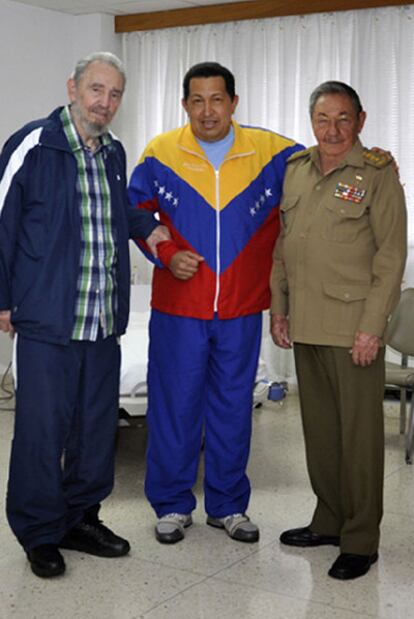Rumors fly about Chávez's health
Venezuela leader's illness questioned as he recovers from surgery in Cuba
Ever since Hugo Chávez traveled to Cuba for surgery earlier this month, rumors have been flying inside and outside Venezuela regarding the president's condition and how serious it is. On Monday, National Assembly president Fernando Soto denied reports that Chávez had cancer and said that the Venezuelan leader would be home on July 5 for the nation's Independence Day celebrations.
Other government officials, including Defense Minister Carlos Mata Figueroa, have said that he is "recovering satisfactorily" in Havana.
On June 10, the 56-year-old Chávez underwent surgery for a reported abscess growth on his pelvis. "It was lucky that the pelvic abscess did not lead to an infection. They have done biopsies and fortunately there is no sign of malignancy," he told Telesur television in a phone interview two days after the reported operation.
However, his prolonged absence compounded by a comment made by Foreign Minister Nicolás Maduro has helped fuel speculation. On Friday the minister said: "The battle that President Chávez is waging for his health must be everyone's battle - the battle for life, for the immediate future of our fatherland."
Citing US intelligence sources, El Nuevo Herald of Miami reported on Saturday that the Venezuelan leader was "critically but not gravely ill" due to an undisclosed condition. The Spanish-language daily also reported that his daughter Rosinés and his estranged wife, Marisabel Rodríguez were "urgently" flown to Cuba in an air force plane last week. Respected Venezuelan journalist Nelson Bocaranda gave more credence to rumors of a serious health problem when he reported that unnamed medical sources had told him the president had prostate cancer.
In the midst of the growing speculation, Chávez posted a message on his Twitter account on Friday, but made no mention of his illness. "Rosinés and my grandchildren Gaby, Manuelito and El Gallito have come for a visit. What a joy to receive this shower of love. God bless them," he wrote.
On Tuesday night, Cuban-state-run television broadcast a video of Chávez, wearing a jogging jacket with the colors of the Venezuelan flag. In it he was seen talking with Fidel Castro. The two were shown pointing to a recent copy of the Communist Party newspaper "Granma" while a television commentator said they discussed current world events. Still there was no mention of Chávez's condition.
Some in the opposition are demanding that the government be more upfront about the president's health. "The president wasn't wounded in battle with enemy troops nor is the nation at war with a foreign power. The medical diagnosis doesn't endanger state security or the peace of the nation. On the contrary, it would end the rumors that are circulating at a cosmic, sidereal rate," wrote columnist Trino Márquez in the Caracas daily El Universal on Monday.
Before traveling to Havana, the National Assembly gave Chávez unprecedented power to govern from Cuba. While he was away, about 5,000 National Guard troops stormed one of the country's most notorious penitentiaries in a June 17 raid to confiscate weapons and drugs hidden by the inmates.
At least 19 inmates were killed, but prisoners' families believe there are more dead. Police have been unable to get inside one of the complexes in El Rodeo prison because inmates have been holding others hostage. The 12-day standoff has also ignited tensions between the families who are camped outside the prison and the National Guard officers. On Monday, the prison warden and his deputy were fired.
Chávez has not said anything publicly about the situation.

Tu suscripción se está usando en otro dispositivo
¿Quieres añadir otro usuario a tu suscripción?
Si continúas leyendo en este dispositivo, no se podrá leer en el otro.
FlechaTu suscripción se está usando en otro dispositivo y solo puedes acceder a EL PAÍS desde un dispositivo a la vez.
Si quieres compartir tu cuenta, cambia tu suscripción a la modalidad Premium, así podrás añadir otro usuario. Cada uno accederá con su propia cuenta de email, lo que os permitirá personalizar vuestra experiencia en EL PAÍS.
¿Tienes una suscripción de empresa? Accede aquí para contratar más cuentas.
En el caso de no saber quién está usando tu cuenta, te recomendamos cambiar tu contraseña aquí.
Si decides continuar compartiendo tu cuenta, este mensaje se mostrará en tu dispositivo y en el de la otra persona que está usando tu cuenta de forma indefinida, afectando a tu experiencia de lectura. Puedes consultar aquí los términos y condiciones de la suscripción digital.








































